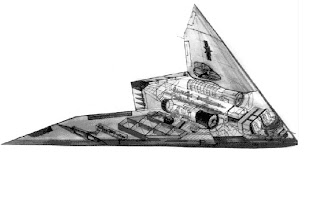The H-8 is a secret strategic stealth bomber by China reportedly to have started trial flights from November, 2007. The during the test flight Chinese leaders were present comprising of Central Military Committee officers, air force logistics department officers, national defense science and industry committee, Xi’an deputy mayor and the provincial party committee assistant deputy secretary for inauguration of the project.
For obvious reasons the actual bomber looks slightly different because the pictures may have been camouflaged to hide the details of true design of the Chinese plane. This is standard operating procedure for new secret weapons and strategic bomber planes. A similar tactic was adopted by the American DoD before the Stealth B-2 bomber was introduced to the public.
The H-8 bomber was a Chinese military aircraft that was a possible successor to the Xian H-6 twin-engine jet bomber. The prototype aircraft was reported to be an enlarged version of the H-6 with under-wing engines, but that the project was canceled in the early 1970s before the bomber went into production. The Chinese military has a stealth bomber called Xian H-8 that has 4 Ws-10A engines derived from Russian and US technology. The engines are made from carbon fiber and coated with special nanotechnology. The Xian H-8 has a max speed of Mach 1.2 and carries stealth missiles in its cargo bay and can also can carry nuclear missiles. China is currently developing stealth fighters like J-XX and J-13 (which is based on the J-10).
As reported , in 1994 there was an official set up development to match the American B-2A as far as possible. The weapons load is targeted around 18 tons and when necessary, the bomber will travel at 1.2 Mach to penetrate defended territory or in case it needs to escape. The bomber will carry a new stealth cruise missile with the range to reach targets upto United States. Range is estimated to notch up to ten thousand kilometers although it is unclear whether this is with refueling or without refueling. However, the bomber is said to be able to refuel. The aircraft uses domestically produced advanced navigation equipment. The bomber has been designed by the 603 institute, and Xian will be responsible for producing the bomber. The bomber will be the first domestically designed and manufactured strategic bomber.
According to reports, the H-8 uses a high-tech blended wing-body design, has fly-by-wire controls, and has an angled fuselage. The wing has massive internal fuel tanks. The aircraft uses carbon fiber and other composite materials and the weapons bay has a rotating weapons profile.The bomber retains a terrain hugging capacity and has a terrain following and mapping radar, satellite data links and advanced digital mapping systems. The bomber also uses advanced stealth technologies including nanometer coating amongst other technologies.
The H-8 will have 4 turbo-fan engines, the core of which is based on the WS-10A. Weapons will include 12 “red birds” or 3 cruise missiles distribute in two weapons bays. Each of the cruise missiles may use a nuclear warhead and can fire from a distance of 3,000 kilometers. It can also use a host of other weapons including laser guided “thunder stone” 6, satellite guidance bomb and anti-ship missile, amongst others.
The H-8 bomber is a Stealth, strategic, and heavy bomber all rolled into one. It carries a crew of two and could fly as fast as Mach 1.4, has a range of 11,000 kilometers (without refueling), and can carry over 18 tonnes of bomb load. It can carry twelve Stealth cruise missiles (each with a range of 3,000 km) on each of the two weapons bays. It could carry an additional three nuclear missiles (350-kilotons each). The bomber will be mass-produced and will enter active service in the PLAAF by 2010. The bomber will replace the old H-6 bombers that the PLAAF have in active service.




